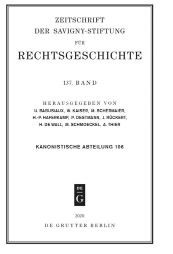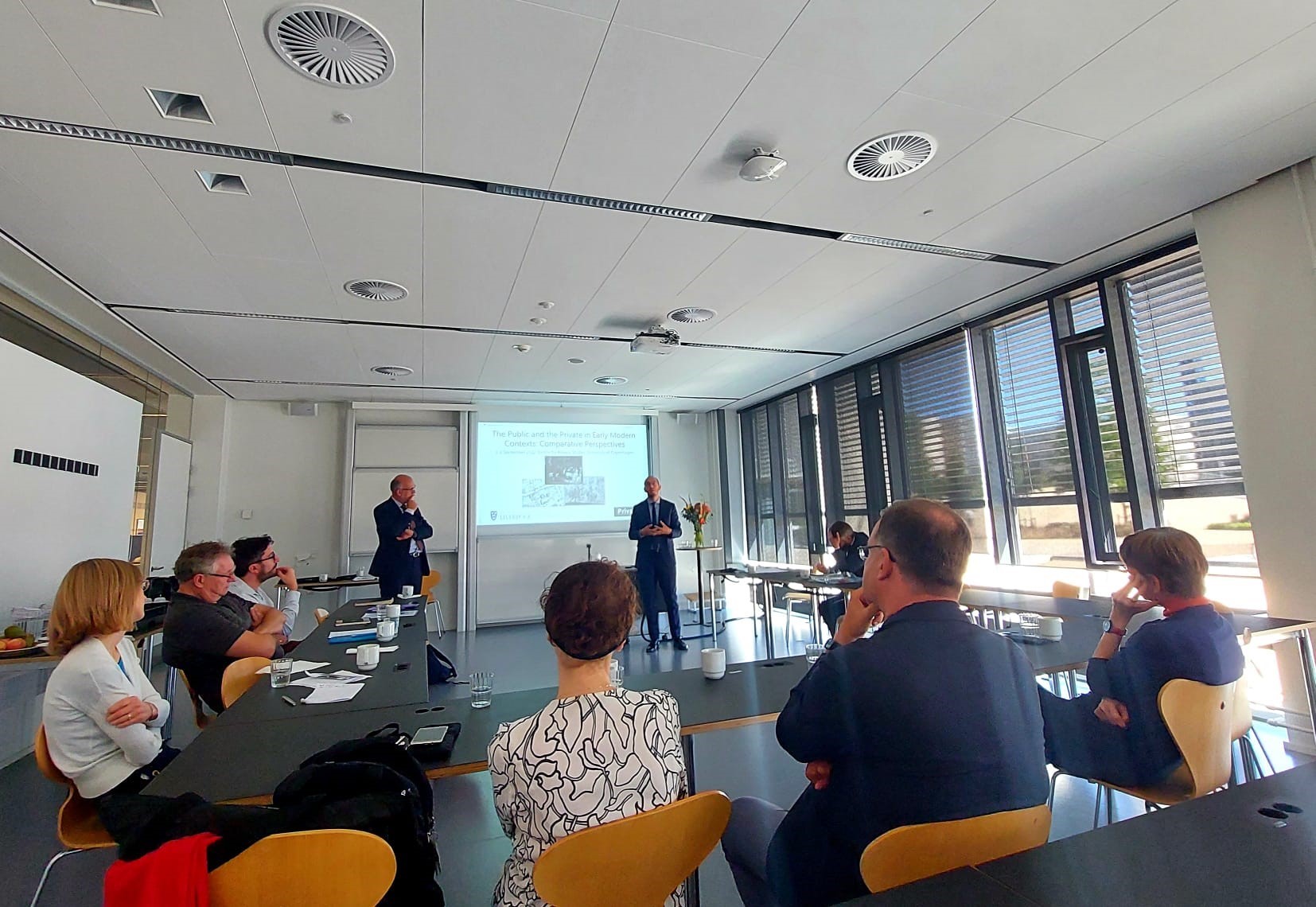Law

Early Modern jurists negotiate public and private interest in different contexts and instances such as property, contracts, inheritance, marriage and sexual conduct, honor and reputation, legal procedure, relationship between rulers and subjects. Privacy is often associated with secrecy or clandestinity and either repressed or protected depending on circumstances and actors involved.
This research theme investigates the concepts of public and private in early modern European legal history. Early modern European society was marked by legal pluralism, resulting in a complex system of normativity, where multiple overlapping legal orders regulated human relations. Theologians and jurists were central to this process, shaping and enforcing social, religious, and political norms. The legal knowledge they produced circulated through a wide array of texts, including collections of laws, court decisions, legal and biblical commentaries, and treatises spanning legal, theological, and philosophical domains. It also appeared in more accessible formats such as legal and theological counsels, handbooks and sermons. This body of knowledge was applied in resolving conflicts across various settings, including ecclesiastical courts, secular jurisdictions, households, and parishes, reflecting the diverse arenas where disputes were mediated and norms enforced.
In the early modern period, the Protestant and Catholic Reformations, along with the expansion into the Indies, redefined political powers as well as religious institutions and norms. At the same time, these movements sowed the seeds for a system of liberties and rights that would later ensure continual renewal and regeneration of the self. The encounters with native Indians, along with the religious wars that followed the Reformations and the rise of legal humanism, laid the groundwork for the development of a “neutral” legal sphere, increasingly detached from theological influences.
In this context, the first phase of PRIVACY investigated the boundaries that theologians and jurists broadly established between the “public” and the “private,” with particular attention to how these concepts evolved in the wake of the Reformations. This phase produced several surveys examining the usage and meanings of the adjectives “public” and “private” across various discourses including marriage law, processual law and the emerging field of public law. In addition, this research delved into the threshold between religious and professional life, with a particular focus on the interplay between religious convictions and professional responsibilities. Methodologically, this research expanded on Harold J. Berman’s proposal for an integrative jurisprudence, adopting a comparative and interdisciplinary approach. It focused on legal and theological printed sources published in Protestant Northern Europe, particularly within the Holy Roman Empire and the Kingdom of Denmark, contrasted with those from Catholic territories such as the Kingdom of Spain.
The second phase of PRIVACY will deepen the investigation into the usage and meanings of “public” and “private” within the realm of ecclesiastical law and church discipline. Additionally, this phase will broaden its scope to include the history of human rights, specifically examining the historical developments that culminated in the emergence of the right to privacy.
Profile articles
 |
Astorri, P., The Redefinition of Clandestine Marriage by Sixteenth-Century Lutheran Theologians and Jurists, in Law and History Review, Vol. 41 issue 1 (2023), 65-92, doi:10.1017/S073824802300010X |
 |
Astorri, P., Jensen S.F., Heinrich Hahn (1605-1668), A Portrait of a Lutheran Jurist at the University of Helmstedt, in Zeitschrift der Savigny Stiftung für Rechtsgeschichte: Kanonistische Abteilung, vol. 108 (2022), 204-242, 39p. https://doi.org/10.1515/zrgk-2022-0005 |
 |
Astorri, P., Nørgaard, L.C., Publicus – Privatus. The Divine Foundations of Authority in Dietrich Reinking, in Journal of Early Modern Christianity, vol. 9/1 (2022), 93-119, 27p. https://doi.org/10.1515/jemc-2022-2020 |
 |
Astorri, P., Can a Judge Rely on his Private Knowledge? Early Modern Lutherans and Catholics Compared in Comparative Legal History, vol. 9:1, 2021, 56-88, 33p. https://doi.org/10.1080/2049677X.2021.1908935 |
Astorri, P., Nørgaard, L.C., A little Republic. The Conceptualization of the Household according to Henning Arnisaeus, in Reformation and Everyday Life (eds) B. Holm, N. Koefoed, Göttingen, Vandehoeck & Ruprecht 2023, 195-219.
Astorri, P., The Redefinition of Clandestine Marriage by Sixteenth-Century Lutheran Theologians and Jurists, in Law and History Review, Vol. 41 issue 1 (2023), 65-92, doi:10.1017/S073824802300010X
Astorri, P., Braun, H., De Bom, E., (eds), A Companion to the Spanish Scholastics, A Companion to the Christian Tradition, vol. 102, Leiden, Boston, Brill, 2022, XVI + 644pp.
Astorri, P., Los primeros teólogos luteranos modernos y el censo redimible: hacia una reformulación de la prohibición del interés / Early Modern Lutheran Theologians and the Redeemable Census: Towards a Reformulation of the Interest Prohibition, in Studia Historica-Historia Moderna, Vol. 44 Núm. 1 (2022): Discursos teológicos y cuestiones económicas: siglos XVI-XVII, 53-76, 23p.
Astorri, P., Jensen S.F., Heinrich Hahn (1605-1668), A Portrait of a Lutheran Jurist at the University of Helmstedt, in Zeitschrift der Savigny Stiftung für Rechtsgeschichte: Kanonistische Abteilung, vol. 108 (2022), 204-242, 39p.
Astorri, P., Nørgaard, L.C., Publicus – Privatus. The Divine Foundations of Authority in Dietrich Reinking, in Journal of Early Modern Christianity, vol. 9/1 (2022), 93-119, 27p.
Astorri, P., Can a Judge Rely on his Private Knowledge? Early Modern Lutherans and Catholics Compared in Comparative Legal History, vol. 9:1, 2021, 56-88, 33p.
Astorri, P., Grotius’s Contract Theory in the Works of His German Commentators: First Explorations in Grotiana n. 41/2020, 88-107, 19p.
Events at the centre
-
Seminar with Prof. Fernanda Pirie (University of Oxford), at the Centre for Privacy Studies (University of Copenhagen), From Private to Public: How the Earliest Laws Defined Justice (May 2023).
-
Seminar with Prof. Hillard von Thiessen (University of Rostock), at the Centre for Privacy Studies (University of Copenhagen), Privacy and Concurrence of Norms in the Age of Ambiguity (April 2023).
-
Seminar with Prof. Gisela Drossbach (University of Augsburg), at the Centre for Privacy Studies (University of Copenhagen), Marriage in Church Law in England at the end of the 12th Century (February 2023).
-
International Symposium The Public and the Private in Early Modern Contexts: Comparative Perspectives (1-2 September 2022) at the Centre for Privacy Studies (University of Copenhagen), with Harald E. Braun (University of Liverpool). Speakers: Prof. Tamar Herzog (Harvard University); Prof. Heikki Pihlajamäki (University of Helsinki); Prof. Sarah Mortimer (University of Oxford); Dr. José Luis Egío García (Frankfurt, MPILHLT); Prof. Virpi Mäkinen (University of Helsinki); Prof. Rudolf Schuessler (University of Bayreuth).
-
Seminar with Prof. Bernardo Sordi (Università di Firenze) at the Centre for Privacy Studies (University of Copenhagen): Diritto pubblico e diritto privato. Una genealogia storica (January 2020, online)
-
Seminar with Prof. Michael Stolleis (Max Planck Institute for Legal History and Legal Theory) at the Centre for Privacy Studies (University of Copenhagen): The Separation of Public and Private law in the Historical Dimension (October 2020) The event was cancelled because of Corona restrictions.
-
Seminar with Prof. James Gordley (Tulane University) at the Centre for Privacy Studies (University of Copenhagen): Private Right and Common Good in Late Scholastic Thought (June 2020, online)

-
La définition du mariage clandestin durant la Réforme luthérienne, Journées internationales de la Société d’histoire du droit, Lausanne, 02 June 2023.
-
El derecho contractual de William Ames (1576-1633): entre la reforma protestante y la escolástica española, IV Jornada sobre la Escuela Española de Pensamiento: Salvación, política y economía. El comercio de ideas entre España y Gran Bretaña en los siglos XVII y XVIII, Madrid, 19 December 2022, invited speaker.
-
Parental Authority and Clandestine Marriage in Reformation Germany, INTERACTIONS, EXCHANGES, AND TRANSFORMATIONS European Legal Traditions and their Impact on the Construction of Gender in a Global Context, Vancouver BC, 18-19 November 2022.
-
Lutheran Theologians on Insolvency and Debt, Debt or Sin? The Moral Roots of Economic and Legal Thought, Louvain la Nueve, 27-28 October 2022, invited speaker.
-
with Lars Cyril Nørgaard, The Limits of “potestas”: Church and state in Henning Arnisaeus (1576-1636), Dietrich Reinking (1590-1664), and Hans Wandal (1624-1675), Police, Law and Religion in the Nordic Countries after the Reformation – New Perspectives, University of Oslo, Faculty of Law, 15-16 September 2022.
-
Clandestine Marriage Redefined: Canon Law in the works of the Lutheran Reformers, the 16th International Congress of Medieval Canon Law in St. Louis (Missouri), 17-23 July 2022.
-
Judging according to Evidence or according to Personal Knowledge? Conrad Hornejus (1590-1649) and Heinrich Hahn (1605-1668) on the Duties of the Judges, at the 6th Biennial Conference of the European Society for Comparative Legal History, University of Lisbon, Lisbon, 22-24 June 2022.
-
Roundtable panel at the RSA Annual Conference Dublin 2022: Quo vadimus? Current and Future Research on Early Modern Spanish Scholastic Thought, along with Harald E. Braun (University of Liverpool). Speakers: Prof. Ian W. S. Campbell (Queen’s University Belfast), Prof. Nicole D. Legnani (Princeton University), Prof. Jean-Pascal Gay (Université catholique de Louvain), Prof. Joerg Alejandro Tellkamp (Universidad Autónoma Metropolitana Iztapalapa); Dr. José Luis Egio Garcia (Max Planck Institute for Legal History and Legal Theory); Prof. Laura Beck Varela (Universidad Autónoma de Madrid). The last two speakers were not able to travel to attend the roundtableBusiness Regulation in Sixteenth-Century Spain and Germany: Catholic and Lutheran Teachings on the Five Percent Contract Law, Theology, and the Moral Regulation of ‘Economy’ in the Early Modern Atlantic World, The Newberry Library, Chicago, Illinois, 25 March 2022.
-
The Public Authority according to Oldendorp, Vigelius and Treutler Humanismus, Jurisprudenz und Konfessionalisierung in Hessen, ca. 1500–1560, Marburg, 11-12 March 2022.
-
The use of the “ius commune” in Lutheran theologians’ doctrine of contract law INTERNATIONAL SCHOOL OF IUS COMMUNE, 40th Course: Ius commune and Western Society, Erice/online, 13-15 December 2021.
-
with Lars Cyril Nørgaard, The Lutheran Household as a Private Jurisdiction, Nordic Variations of Protestant Governance. A series of NOS-HS workshops: Uppsala – Aarhus – Oslo. HOUSEHOLD. Workshop in Aarhus / online, 2 December 2021.
-
Common Good and Private Rights in the First German Treatises on Public Law, the Venice World Multidisciplinary Conference on Republics and Republicanism, Venice/online, June 13, 2021.
-
Parental Authority, Privacy, and the Reformation of Marriage, Reformation and Everyday Life, Aarhus/online, June 1, 2021.
-
Parental Authority, Privacy, and the Reformation of Marriage, REFORC Annual Conference, Budapest/online, May 6, 2021.
-
Privacy Regulation between Law and Moral Theology, Annual Conference of the Renaissance Society of America, Philadelphia/online, April 21, 2021.
-
Public Debt in Early Modern Lutheran Germany, Aux origines de la dette publique en Europe (XIIIe-XVIIe), Lyon/online, November 12-14, 2020, invited speaker.
-
Normative Knowledge in the Making: The Case of the Consultationes constitutionum saxonicarum (1599-1601), Practices of Privacy Online Symposium, April 24- May 31, 2020.
Partner projects
LAW AND THE INNER SELF PROJECT
Presentation of theme leader, Paolo Astorri

|
I am Assistant Professor of Legal History. My research focus on the interaction between law and religion in the early modern period. I am especially interested in the influence of religious convictions on the legal, political and economic thought. Read more about my research here |
